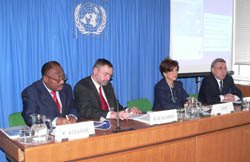 Today, Hamid Ghodse and Philip Emafo of the International Narcotics Control Board launched a media offensive in the UK as part of the release of INCB’s 2007 Annual Report. Appearing on Channel 4 News, Channel 5 News, the BBC website and the front page of this morning’s London Metro, both Board members raised their concerns as UN drug control 'experts' on what they see as an issue of key importance.
Today, Hamid Ghodse and Philip Emafo of the International Narcotics Control Board launched a media offensive in the UK as part of the release of INCB’s 2007 Annual Report. Appearing on Channel 4 News, Channel 5 News, the BBC website and the front page of this morning’s London Metro, both Board members raised their concerns as UN drug control 'experts' on what they see as an issue of key importance.
Here is a hint:
It is not ensuring access to harm reduction services to prevent HIV and hepatitis C transmission through injecting drug use and to ensure the right to health of all people who use drugs.
It is not ensuring access, for everyone in need, to opiates for pain relief, including those with terminal diseases.
It is not raising their concerns about a possible reinstatement of the ‘war on drugs’ in Thailand which, in 2003, claimed the lives of over 2,500 people through extrajudicial killings.
No, the United Nations body responsible for overseeing the international drug control conventions is worried about celebrities using drugs, claiming that dealing with famous people in a lenient manner encourages a permissive attitude to drugs among young people.
There are a number of extremely troubling aspects to the Board’s position in this regard.
Firstly, an international body geared towards monitoring the three UN drug control conventions has far more pressing concerns than what Kate Moss is snorting or Amy Winehouse is smoking. Thirty percent of all HIV infections, excluding Sub-Saharan Africa, are through unsafe injecting drug use, an issue that is all but ignored in the report apart from some mentions of harm reduction without positive commentary. The Board visited Brazil in 2007 and the country features in this year’s report. Yet there is no mention of the hundreds of deaths in the favelas through indiscriminate police violence. The INCB also visited Viet Nam in 2007, but has not mentioned the all too common application of the death penalty for drug offences in violation of international human rights law.
Secondly, the Board has created a new category of offender, the ‘celebrity user’, one to be made an example of for the benefit of the greater good, something that is completely outside its mandate under the conventions. Indeed the INCB presents no evidence that celebrities are treated more leniently in the first place. This also runs contrary to the ostensible commitment to ‘equality before the law’ focused on in this year’s annual report.
Thirdly, what Ghodse and Emafo are saying, in effect, is that we should criminalise drug users, a position entirely contradictory to the first chapter of the INCB Annual Report, which calls for a focus on traffickers and not individual users.
This aspect of the Annual Report has been, until now, all but overlooked, with organisations such as TNI and IDPC rightly focusing on the more pressing issues of human rights and harm reduction.
Today’s publicity, however, cannot be ignored. The International Narcotics Control Board should be worried less about soundbites and more about the real issues and the lives of millions affected by their work.
Wednesday, 5 March 2008
HIV? Human Rights Abuses?...The INCB Has More Pressing Concerns
Labels: human rights, INCB
Subscribe to: Post Comments (Atom)



6 comments:
Yes indeed they do have pressing concerns such as reducing and preventing drug use, especially among young people. Given that Sweden has successfully achieved this so can other countries including the UK.
To do that we need to change our education strategy on drugs, focusing more on the total harms they cause, as compared with the present ineffective rubbish, which almost encourages experimentation.
We could also learn a great deal about reducing drug use, thereby reducing total harms by studying countries like Singapore, which contrary to implied suggestion does not execute drug users.
First time drug offenders do not even attract a criminal conviction, but they are entered into a programme to assist them in becoming drug free, followed by continous aftercare to ensure that continues.
The drug treatment strategy is so successful, that of those convicted for drug offences in 2006/7, only 23 per cent were re-offenders; now that is realy reducing total harms.
Singapore has a mandatory death sentence for drug trafficking and actively carries out executions.
http://www.amnesty.org/en/region/asia-and-pacific/south-east-asia/singapore
Our report on the death penalty does not distinguish between users and traffickers, it states unambiguously that the application of the death penalty for any drug offence is a violation of international human rights law.
yeah right, absolutely true
Yes I realise that, but there is an obvious and considerable difference between users and traffickers. So why not differentiate?
It is interesting that you have not chosen to comment on either Sweden or Singapore's tremendous success in reducing total harms.
We do not differentiate between drug users and drug traffickers when it comes to capital punishment because there is no differentiation in international law. Execution in either circumstance violates international human rights law. See our recent report on the death penalty for drug offences (www.ihra.net/uploads/downloads/NewsItems/DeathPenaltyforDrugOffences.pdf) for an explanation of the law in this regard.
In terms of the "success" of Sweden in reducing drug related harms, we refer people to our submission to the UN Committee on Economic, Social and Cultural Rights that outlines our concerns about Sweden's failure to meet their obligations under Article 12 of the International Covenant on Economic, Social and Cultural Rights (the right to health) at www.ihra.net/uploads/downloads/NewsItems/IHRASDUUSubmission2007.pdf
See also the concerns raised about Sweden's lack of harm reduction measures by the UN Special Rapporteur on Health in his report of his 2007 Mission to Sweden www2.essex.ac.uk/human_rights_centre/rth/docs/sweden.pdf
In terms of Singapore, Amnesty International notes that the state has possibly the highest rate of executions per capita of any country in the world, the vast majority of these for drug offences, and therefore in contravention of international human rights law as described above.
Is this harsh approach "successful" even in its own terms? Well, as described in 2000 by Prof Michael Hor of the Faculty of Law at the National University of Singapore:
"One might have expected that if the death penalty is being imposed on drug offences in order to deter or incapacitate, the government would be keenly interested in statistical and other studies to find out if, in fact, the increased penalties are working. But such studies, if they exist, are seldom revealed. Statistical data are not provided in any consistent or meaningful way by the government. One can only speculate why."
Singapore is also a tiny city state under a secretive and borderline totalitarian regime. It is not a useful comparator, even if we did have a data with which to compare.
Chewing gum is illegal in Singapore.
Peter. I hope you will join IHRA and the UN (including I read today the UNODC) in condemning the use of the death penalty for drug offenses in line with international law, and human rights abuses more broadly where ever they may occur.
Post a Comment